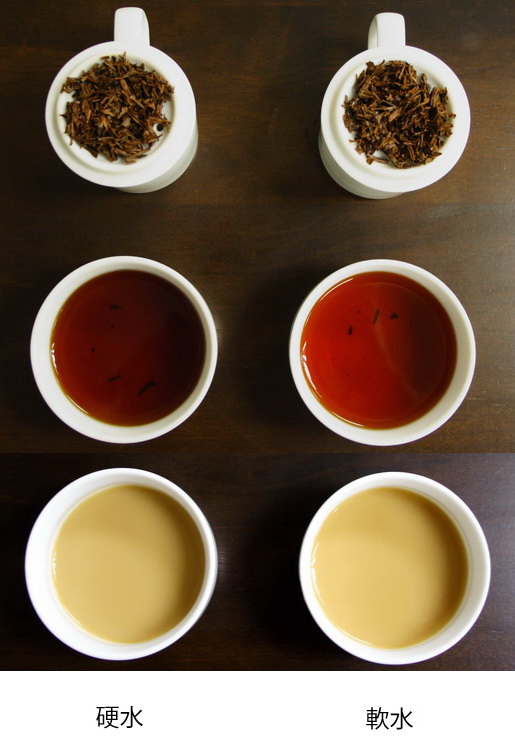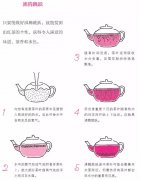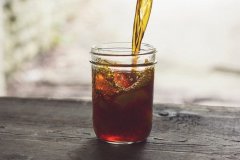How much is the total hardness of tea water? How much is the best influence on the taste of tea? What milk is good for milk and black tea?
water
A good cup of black tea is inseparable from two elements, tea and water.
Water seems like a simple thing, but it is the most important element that should not be ignored. You know, the color and flavor of black tea will change with the water quality.
The hardness of water is something we often talk about when making coffee and tea. The hardness of water refers to the content of magnesium and calcium per liter, less than 120 mg is soft water, and more than 120 mg is hard water, but it is usually further subdivided.

0 to 100 mg is regarded as soft water, 101 mg to 299 mg as medium hard water, and more than 300 mg as hard water.
The black tea brewed with soft water has light brown color, strong astringent taste and obvious aroma.

Take Japanese water as an example, Japanese water is 30 mg to 60 mg, which belongs to soft water, so the black tea is light in color, but has a strong astringent taste.
When brewing black tea in medium-hard water, the calcium and magnesium in the water will interact with the catechins in black tea. The tea color is dark, turbid, lack of transparency, weak astringency, light taste but neat tail, and weak aroma.

Take the water in London as an example. The hardness of water in London ranges from 180 mg to 230 mg. This kind of black tea brewed in water, the color of the tea is black-red, lack of transparency, the astringent taste is not obvious, the tea taste stops abruptly in the mouth, and there is no final rhyme to speak of.
Although the lack of black tea characteristics, but the astringent humidity is more palatable, poured into the milk after showing an attractive creamy brown, the taste is also light and crisp.
milk
There are two ways to say milk tea made from black tea and milk, one is Milk Tea, but in Britain, at the western end of Eurasia, the local saying is Tea with Milk, literally translated as black tea and milk.
As the smell of milk is easy to the aroma of the country's black tea, so when making milk tea, the choice of black tea generally choose its own strong characteristics of black tea.
In particular, the hardness of the local water in London is high, the aroma and astringency in black tea are not easy to be extracted, and black tea with strong characteristics is carefully selected.
Among them, the most representative are the three famous teas in the world: Darjeeling black tea in India, Keemun Black Tea in China, and Wuwo black tea in Sri Lanka, each of which has its own characteristics, so it is very suitable for brewing milk tea.

However, it should be noted that Darjeeling's spring-picked tea has a strong astringent taste, but the color of the tea is too light. If milk is added, the color becomes light beige, rather than attractive milk is brown. Therefore, when choosing Darjeeling black tea to brew milk tea, we often choose summer picking tea and autumn picking tea.
In addition to the three world famous teas mentioned above, Assam black tea, Nilgiri black tea, Kenyan CTC black tea, Sri Lankan Luhanna black tea and so on, also match the flavor of milk.
[choice of milk]
Nowadays, when drinking milk tea, most people are most concerned about the choice of black tea, but the British are on the contrary. This is because milk used locally in the UK will try to maintain heterogeneity when sterilized at low temperature for a long time or at high temperature for a short time.
When the milk is put in the refrigerator, milk fat and casein microspheres float to form a layer of white cream. This part of the cream is called the cream layer, and the milk fat content is 18% to 28%.

Milk, along with the cream layer, is poured into a cup and then poured into black tea, which becomes the Tea with Milk fascinated by the British.
Low temperature sterilization can prevent milk protein from being denatured due to excessive heat, so it belongs to half-life state. The ultra-high temperature sterilization (130 degrees Celsius, 2 seconds) can make the milk completely sterile, but the protein will be overheated and even scorched to produce the sulfur smell of hydrogen sulfide.
The fat ball of homogeneous milk has been chopped, the water is mixed with homogeneous milk, and the milk fat brings a mellow feeling along with the surface of the mouth.
In addition, ultra-high temperature pasteurized milk will make the mouth sticky and greasy, making it difficult to feel refreshing, while low-temperature sterilized milk tastes light and smooth, which makes people feel unfinished.
Important Notice :
前街咖啡 FrontStreet Coffee has moved to new addredd:
FrontStreet Coffee Address: 315,Donghua East Road,GuangZhou
Tel:020 38364473
- Prev

The best correct techniques and precautions for brewing black tea teach how to brew black tea best to drink
As mentioned earlier, when black tea is brewed, after experiencing a state called jumping, the extracted tea has the most balanced color, flavor and flavor. But how do we create the state of jumping? First of all, let's take a look at the steps to make the jump: ① pours hot water and all the tea leaves float. After absorbing water, the ② tea began to sink. ③ heat convection makes tea
- Next

How to make Iced Black Tea Beverage the efficacy and function of Iced Black Tea Beverage
In the hot summer, the children prefer refreshing tea, while milk tea, because of the addition of milk, will even feel greasy. At this time, Iced Black Tea became the best choice. Iced Black Tea originated in St. Louis at the beginning of the 20th century, and in the end, its popularity far exceeded that of traditional hot black tea in England. Iced Black Tea is so popular for a variety of reasons, easy to drink,
Related
- Beginners will see the "Coffee pull flower" guide!
- What is the difference between ice blog purified milk and ordinary milk coffee?
- Why is the Philippines the largest producer of crops in Liberia?
- For coffee extraction, should the fine powder be retained?
- How does extracted espresso fill pressed powder? How much strength does it take to press the powder?
- How to make jasmine cold extract coffee? Is the jasmine + latte good?
- Will this little toy really make the coffee taste better? How does Lily Drip affect coffee extraction?
- Will the action of slapping the filter cup also affect coffee extraction?
- What's the difference between powder-to-water ratio and powder-to-liquid ratio?
- What is the Ethiopian local species? What does it have to do with Heirloom native species?

